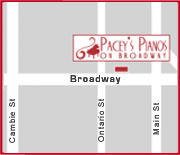Piano Sales Are Not Created Equal
Campus Piano Sales
Students are back at school and the piano sales have begun. There are a lot of competing offers and a lot of advertisements enticing people to come to one store or another and it is often difficult to decipher which is real and which is just marketing. Campus Piano sales are one such tactic that some stores take part in and while on the surface it might seem like a good deal, when it is deconstructed it quickly loses its lustre.
Music schools do not change their instruments on an annual or semi-annual basis. Doing so would force the school to absorb all of the depreciation only to purchase brand new pianos at full price. Typically at campus sales, there are only a handful of school pianos ready for retirement the rest are new and used pianos directly from the retailer’s sales floor. What is being promoted is often not what is available.
Pianos from the music department are used heavily and replaced when it is not economically viable to repair them, usually this is before they look old and while they have a modern manufactured date, but it is when the piano not performing well. It is much like buying a retired taxi-cab for a personal car, it might not appear old or be an old model, but it will have very high mileage and have seen a great deal of use. Even if it has been well maintained, it will no doubt soon be needing substantial repair.
Selling a piano at a campus sale, increases costs by adding extra moves and additional rent or commissions paid to the school to use their space and name. Since these are extra costs not applicable to buying from the retail environment, they need to be recovered by the dealer and become embedded in the price limiting your negotiating power. In many cases, buying at a campus sale is more expensive than buying directly from a store.
Since it is so expensive to move all of these instruments around the city, the retailer needs to sell as many of them as possible at the sale location in order to avoid the costs of moving them back to the retail store. One might think that this gives you more power in bargaining, but for all but the best negotiators, it results in high-pressure sales tactics as salesmen try to meet their quotas and sell as many as possible. Buying a piano is a personal experience, it is a large investment and is worthy of spending thoughtful time deciding on which individual piano is right for you. High pressure tactics force people to make rash decisions without the benefit of time to get to know an instrument. Consumers are better off purchasing directly from a store when they have time on their side and are able to explore other stores and brands.
The idea of the campus sale sound good but with a more careful look becomes nothing more than a gimmick. In many jurisdictions, they contravene truth in advertising legislation and marketing standards.
Huge Discount sales!
Pianos are expensive items and if a deal looks too good to be true, it probably is.
Selling anything at 70% off can only be for a few reasons:
- It is damaged inventory that needs to be liquidated. Pianos are long lived and models do not change regularly so expiry is rare.
- The retailer first raised prices to accommodate the big sales drop trying to fool the consumer with the idea of big discounts.
- The company is going out of business and is trying to cash out which leaves consumers without a warranty or recourse if problems arise.
Any one of these is bad for the consumer and bad for the industry. You should always trust a store with a solid reputation and a history of good business.
(c) 2024 Pacey's Pianos. All rights reserved.

